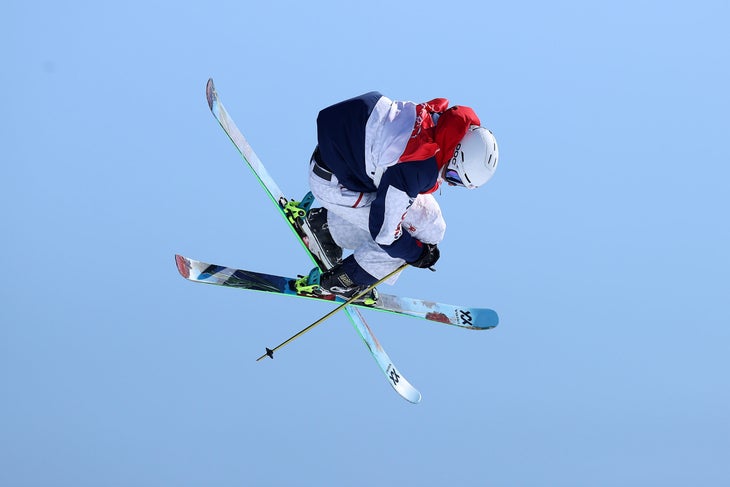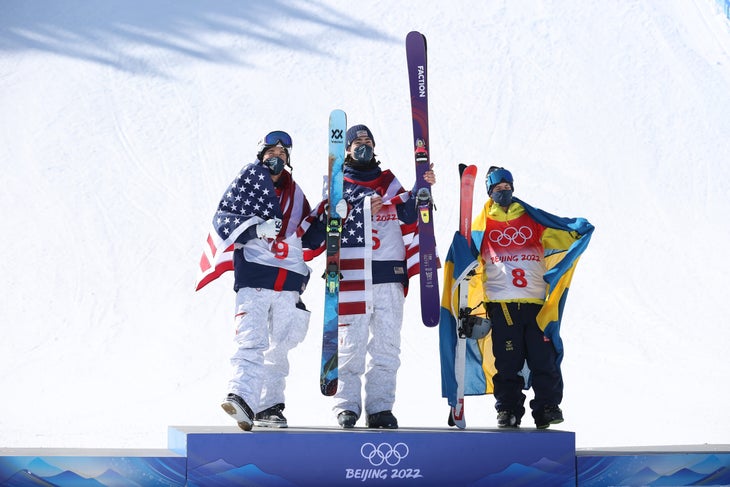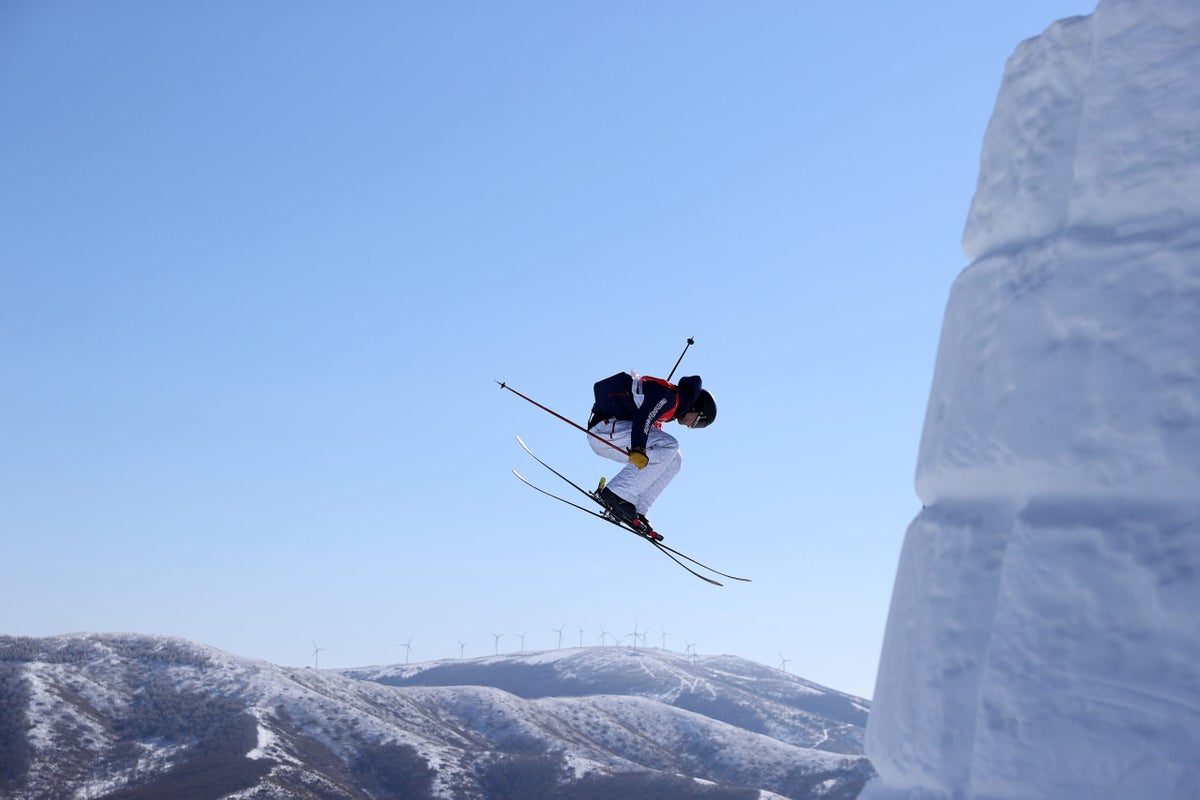Products You May Like
Receive $50 off an eligible $100 purchase at the Outside Shop, where you’ll find gear for all your adventures outdoors.
Sign up for Outside+ today.
Alex Hall stomped the gold-medal winning run about 20 minutes into the men’s Olympic Slopestyle event and called it, “THE most special win of my career because I did exactly what I wanted to do,” meaning, you know, a “right dub 10, pretz one” on the final jump. “It definitely was the best Slopestyle run I’ve ever done,” he said.
His U.S. teammate Nick Goepper finished second and won something even more valuable than silver.
Validation.
And not just for the record books. True, Goepper had just bagged his third Slopestyle medal in three Olympics. But the silver stamped out a lot of self-questioning he had done off the hill since he claimed his first medal eight years earlier, in Sochi, as a 19-year-old bronze medalist who completed a U.S. sweep of the inaugural Slopestyle podium.

Back then, the Midwesterner soaked up the afterglow like a rock star. He showed up on cereal boxes and late-night TV, chatted up Taylor Swift at the Golden Globes, and held a social-media contest where the coveted prize was a date with himself.
He also began to drink… and drink… and drink even more until he started dreaming of ways to kill himself. One day, as he stared into the abyss, he called his mother to say that he was going to swallow an entire bottle of vodka—not coincidentally in Lamb’s Canyon near Park City, Utah, where one of the world’s best aerials skiers, Jeret “Speedy” Peterson, shot himself in 2011, a year after taking the Olympic silver in Vancouver.
More: Follow SKI’s Full Coverage of the 2022 Beijing Winter Olympics
Fortunately, Goepper got help and has been sober since September 2015. “I feel amazing,” Goepper said Wednesday, after matching the silver medal he earned in 2018. “I feel like I deserve this,” he added. “I’ve done a lot of work on myself—even more work than I’ve done on the slope. I think that’s even more important: to get a good foundation as a person, before you go kick ass and do corks.”
“Even at this point in my career, I’m always contemplating if I’m doing the right thing to succeed,” Goepper said. “I’m still second-guessing myself. Am I stretching enough? Eating the right food? So for it to pay off in this way, based on how I’ve been taking care of myself in the last year, is validating.”
On a day when judges harshly penalized small mistakes on the rails, Goepper nailed his jib tricks in his second run (including a backside 630 off the distinctive “shred temple”) and threw a variety of 1440s on the bottom jumps to score 86.48 points (4.53 behind Hall).
The third American in the final, Colby Stevenson, tried to complete a U.S. podium but botched the second rail in his last chance and immediately vented an audible “Argh!” “I gave it everything I had,” Stevenson said at the bottom of the hill. Even though he placed seventh in slopestyle, he still flies home to Park City with the silver medal in Big Air.
The penultimate skier of the day, last week’s Big Air gold medalist Birk Ruud, tried to top the two Americans in his third run, but the Norwegian only managed fifth place. Last came Andri Ragettli of Switzerland, the 2021 world champion and 2022 Winter X Games gold medalist. As in each of his runs, Ragettli hiked to the highest possible point of the course to start his run, only to miss the takeoff of his first jump and place fourth behind Sweden’s Jesper Tjader, 27, who claimed the bronze. As the U.S. flags were unfurled, Ragettli chucked his skis over the fence in frustration.

In the end, the day belonged to Hall, 23, who grew up in Switzerland and holds an Italian passport in addition to U.S. citizenship. “Honestly,” he said, “I was really, really surprised I landed the first run—especially with this course, how tough those long rails are. I wasn’t sure if [the 90.01 score] was going to hold but I’m really stoked it did.
Hall’s last trick probably sealed it, one that Stevenson calls Hall’s “signature bringback.” It’s listed on the score sheet as a “right-side double-cork 1080 Pretzel One.” It’s technically a 1080 but Hall rewinds the last 180 degree rotation mid-air to land a 900. He learned it this fall but said it’s exceedingly difficult because “it’s hard to judge the rotation and really tough when I don’t know my speed exactly.” The gusty wind at the venue complicated it further.
Related: Surprise Upset in Women’s Slopestyle As U.S.-Born Eileen Gu Settles for Silver For Host Nation China
Entering that trick on his winning run, “I was freaking out,” Hall recalled. “I was just trying to think, ‘Stay calm and do everything you can to bring it back to 900.’ I’m glad it worked out.”
The American 1-2 finish in Slopestyle marked the third time in Olympic history the U.S. won both gold and silver in a single freestyle ski event. The first was the 2014 U.S. Slopestyle sweep in which Goepper took bronze. The second came in 2018 when skiers David Wise and Alex Ferreira went 1-2 in the Halfpipe. Both Wise and Ferreira will have a chance to repeat that in Beijing as Wise goes for his third consecutive gold medal. Ski Halfpipe begins on Thursday with the qualifying runs.
